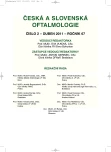-
Medical journals
- Career
Ocular Signs and Symptoms after Scoliosis Surgery (a Case Report)
Authors: B. Lipková; M. Káčerik; O. Krauseová; J. Popluhár
Authors‘ workplace: Očné – ORL oddelenie, oddelenie detskej ortopédie, FNsP v Žiline primár MUDr. M. Štubňa, primár MUDr. J. Popluhár, PhD.
Published in: Čes. a slov. Oftal., 67, 2011, No. 2, p. 67-70
Category: Case Report
Overview
Scoliosis surgery offers the only resolution of this orthopedic problem. Regarding to important structures, orthopedist maneuvers during surgery around, surgeon’s great concentration is demanded.
Curious complication after scoliosis surgery is the combination of unilateral Horner’s syndrome in conjunction with contralateral Pourfor du Petit’s syndrome, which occurred after reoperation with supermounting into the 1. thoracic spondyle of 13-years old girl. It was accompanied by general weakness while patient’s trying to get up. Excluding other neurological disorders irritation of cervical sympathicus is accepted like a etiology factor.
The inconvenience disappeared spontaneously and gradually 3 months after the reoperation, mobility is in good order and x - ray documents firm fixation of supermountig.Key words:
scoliosis, anisocoria, Horner’s syndrome, Pourfor du Petit’s syndrome
Sources
1. Deng, Y., Zhou, Y., Lu, G., et al.: Complication of thoracic pedicle screw fixation in spinal deformities. Zhontiek Da Xue Xue Bao Yi Xue Ban, 2009, 34; 8 : 820–824.
2. Ebraheim, N.A., Lu, J., Yang, H., et al.: Vulnerability of the sympathetic trunk during the anterior approach to the lower cervical spine. Spine. 2000, 25; 13 : 1603–6.
3. Fulton, J. F.: Edward Selleck Hare (1812–1838) and the Syndrome of Paralysis of the Cervical Sympathetic. Proc R Soc Med, 1929, 23; 2 : 152–157.
4. Garibaldi, D.C., Hindman, H.B., Grant, M.P., et al.: Effect of 0,5% apraclonidine on ptosis in Horner syndrome. Ophthal Plast Reconstr Surg. 2006, 22; 1 : 53–55.
5. Hedequist, D.J., Emans, J.B., Hall, J.E.: Operative treatment of scoliosis in patients with a Fontan circulation. Spine (Phila Pa 1976). 2006, 31; 2 : 202–205.
6. Herman, L. van der Wiel: Johann Friedrich Horner (1831–1886). J Neurol, 2002; 249 : 636–637.
7. Kumar, N., Jivan, S., Topping, N., et al.: Blindness and rectus muscle damage following spine surgery. Am J Ophthalmol. 2004, 138; 5 : 889–891.
8. Lu, J., Ebraheim, N.A,, Nadim, Y., et al.: Anterior approach to the cervical spine: surgical anatomy. Orthopedics. 2000, 23; 8 : 841–845.
9. Myers, M.A., Hamilton, S.R., Bogosian, A.J, et al.: Visual loss as a complication of spine surgery. A review of 37 cases. Spine, 1997, 22; 12 : 1325–1329.
10. Pahys, J.M., Guille, J.T., D’Andrea, L.P., et al.: Neurologic Injury in the Surgical Treatment of Idiopathic Scoliosis: Guidelines for Assessment and Management. J Am Acad Orthop Surg, 2009, 17; 7 : 426–434.
11. Pearce, J. M.: A note on Claude Bernard-Horner‘s syndrome. J. Neurol. Neurosurg. Psychiatry, 1995; 59 : 188–191.
12. Ségura, P., Speeg-Schatz, C., Wagner, J.M, et al.: Claude Bernard Horner syndrome and its opposite, Pourfour du Petit syndrome, in anesthesia and intensive care. Ann Fr Anesth Reanim. 1998, 17; 7 : 709–24.
Labels
Ophthalmology
Article was published inCzech and Slovak Ophthalmology

2011 Issue 2-
All articles in this issue
- Keratoconjunktivitis sicca (KCS) při folikulární konjunktivitidě u dospělých pacientů s etiologií Chlamydia pneumoniae (souhrnná dvanáctiletá studie)
- Visual Functions and Quality of Life in Patients with Keratoconus
- EPI-LASEK – Our Experience
- Comparison of Topic Mydriasis and Mydriasis Achieved by Soaked Cellulose in the Conjunctival Sac
- Benzalkonium Chloride Daily Dose – an Important Criterion in Glaucoma Treatment
- Ocular Signs and Symptoms after Scoliosis Surgery (a Case Report)
- Czech and Slovak Ophthalmology
- Journal archive
- Current issue
- Online only
- About the journal
Most read in this issue- Benzalkonium Chloride Daily Dose – an Important Criterion in Glaucoma Treatment
- Ocular Signs and Symptoms after Scoliosis Surgery (a Case Report)
- Visual Functions and Quality of Life in Patients with Keratoconus
- Keratoconjunktivitis sicca (KCS) při folikulární konjunktivitidě u dospělých pacientů s etiologií Chlamydia pneumoniae (souhrnná dvanáctiletá studie)
Login#ADS_BOTTOM_SCRIPTS#Forgotten passwordEnter the email address that you registered with. We will send you instructions on how to set a new password.
- Career

